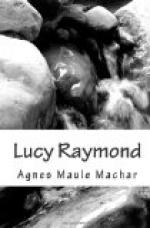Lucy could not help noticing the very slight mourning worn by the family, if indeed it could be called mourning at all. But even this slight mark of respect would hardly have been accorded to Mr. Raymond’s memory, but for Lucy’s coming among them in her deep mourning. “People would notice, and it wouldn’t look well,” Sophy had said; and this decided the question, though the girls grumbled a good deal at the inconvenience of it, especially at a time of the year when they were usually so gay, and wanted to wear colours. Stella was the only one who did not object. She had imbibed a strong respect for her uncle, and wore her black dress with a certain satisfaction, in the feeling that she was doing honour to his memory.
There was a good deal of lively talk during dinner, almost unintelligible, however, to Lucy, from her ignorance of the persons and things talked about. The tone of conversation, however, was as uncongenial as were the subjects. Edwin had a cynical air, partly real, partly affected; and the girls’ remarks were characterized by the same sort of flippancy which had often jarred upon her in Stella.
After dinner Edwin disappeared, Mr. Brooke became absorbed in his newspapers, Sophy was soon engrossed with a novel, and Ada and her mother employed themselves in some very pretty worsted embroidery. Lucy, of course, had no work as yet, and Stella resorted to her old fashion of lounging about doing nothing in particular, except talking. She expatiated largely, for Lucy’s benefit, upon the classes and masters in the fashionable school to which her cousin was to accompany her, giving her various scraps of information respecting her future classmates, with a list of their foibles and peculiarities amusingly described, but rather wearisome to a stranger. Mrs. Brooke questioned Lucy about her previous studies, looking doubtful when she heard of Latin and mathematics, and saying she was afraid “she had been made a little of a blue.” At her aunt’s request, she sat down at the handsome piano, and rather nervously got through a simple air, the only one she knew by heart. She felt she had not done herself justice, and Stella said apologetically, “You know she never had any teacher but Mrs. Steele, and she has no style.”
Lucy’s cheek flushed at the disparaging remark, but Mrs. Brooke only said, “I hope you will play better than that, my dear, when you have had Signor Goldoni for awhile. Do you sing?”
“Only hymns, aunt. We often sing them on Sundays at home.”
“Well, if you have anything of a voice, you will soon do better than that. Any one can sing hymns.”
Lucy made no reply, but she privately thought that very few could sing them like her Aunt Mary. Then, recollecting that Stella had told her how well Sophy played and sang, she turned rather timidly to her with the request, “Won’t you sing, Cousin Sophy?”
“Do, Sophy,” added her mother and Stella, both at once.




